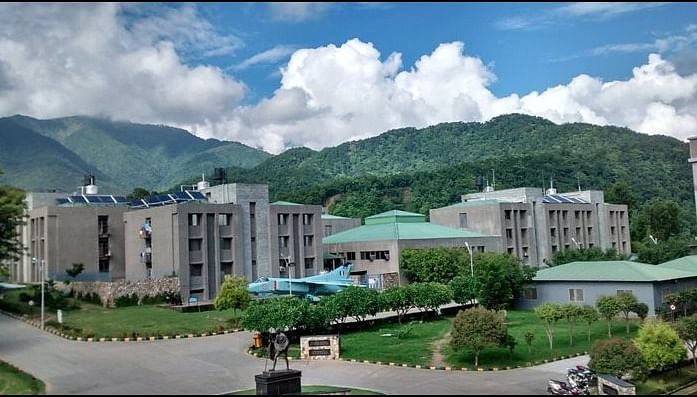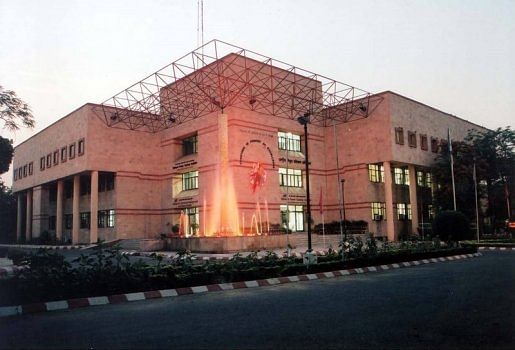MBA in Power Management: Course Details, Eligibility, Admission, Fees

MBA in Power Management is a 2-year professional management course that aims to provide in-depth knowledge on efficient Power Management concepts and measures. MBA in Power Management course highlights managerial principles based on energy sources, power plants, and electricity industry compliance. The syllabus for the MBA in Power Management course showcases subjects such as Energy Resources and Power Plant Systems, Solar Power Development, Energy Power Trading, etc.
MBA in Power Management Admissions are based on entrance exam scores and GD+PI evaluation rounds. MBA in Power Management admission rests on certain eligibility criteria, such as a 50% minimum aggregate in an undergraduate degree in any area, with a 5% relaxation for the Reserved category. The average fee for an MBA in Power Management is INR 70,000 to 4 LPA.
Table of Contents
- About MBA in Power Management
- MBA in Power Management Eligibility Criteria
- Why Choose an MBA in a Power Management Course?
- MBA in Power Management Admissions 2023
- MBA in Power Management Entrance Examinations
- Top MBA in Power Management Colleges in India with Fee Details
- Types of MBA in Power Management Courses
- Syllabus and Subjects for MBA in Power Management
- MBA in Power Management vs MBA in Energy Management
- Salary of an MBA in Power Management Graduate In India
- Courses After MBA in Power Management
- Career Options After MBA in Power Management
- Skills To Excel In For MBA in Power Management
MBA in Power Management Course Details
| Degree | Masters |
| Full Form | Masters of Business Administration in Power Management |
| Duration | 2 Years |
| Age | There is no upper age limit to enroll in the course. |
| Entrance Exam | CAT, XAT, MAT, CMAT, GMAT, etc. |
| Minimum Percentage | A minimum of 50% marks in UG for the unreserved category and 45% marks for reserved category students. |
| Average Fees | ₹20 LPA |
| Similar Options of Study | MBA in Energy Management |
| Average Salary | INR 3-15 LPA (Source: Payscale) |
| Employment Roles | Engineering Manager, Commodity Trader, Industrial Engineer, Production Manager, EPC Manager, etc. |
| Top Recruiters | NTPC Limited, Power Grid Corporation of India Limited (POWERGRID), Adani Power, Tata Power, Siemens Energy, etc. |
About MBA in Power Management
MBA in Power Management stands for Masters of Business Administration in Power Management. It is a specialized 2-year postgraduate degree, the course components of which focus on procuring and managing resources to optimize power and energy consumption. MBA in Power Management is a specialized course under the MBA course.
MBA in Power Management Admissions requires candidates to clear the cut-offs for management entrance exams such as CAT, XAT, MHT CET, etc. The most prominent colleges offering an MBA in Power Management are the University of Petroleum and Energy Studies, Maharshi Dayanand University, and the National Power Training Institute.
Upon completion of the MBA in Power Management course, graduates have an abundance of career opportunities in various domains such as PSUs, Private companies, MNCs, etc. The average salary for a fresh graduate may range from INR 3-15 LPA. (Source: Payscale)
MBA in Power Management Eligibility Criteria
Students opting for an MBA in Power Management have to satisfy certain criteria to be admitted into the course. MBA Power Management eligibility criteria is highlighted below for clarity:
- Aspirants must have finished a UG degree in Management or Science field with a minimum of 50% aggregate marks for the unreserved category and 45% marks for the SC/ST/OBC/PwD category from a board-recognized university.
- Some colleges specify the MBA in Power Management eligibility criteria as a 60% minimum aggregate.
- There is no age limit for pursuing an MBA in Power Management course.
Why Choose an MBA in a Power Management Course?
According to NRDC, India’s wind and energy sector employed 52,000 people for the year 2022, 8x more than in 2021. This leads to the fact that power and energy-related jobs are on the rise, and the need to fill these job roles with competent managers is only going to increase with the introduction of more innovative energy sources.
Here are some important aspects of the MBA Power Management course:
- A fresh graduate in the MBA Power Management course will come across a wide array of career prospects in many fields such as private and public sector energy corporations, or manufacturing companies.
- Students of MBA in Power Management are equipped with industry-relevant subjects such as Power Financial Management, Power Sector Structure and Functioning, Energy Power Trading and Network Administration, etc.
- Graduating in an MBA Power Management course opens up graduates to an array of lucrative high-paying jobs in the Energy and Power sector. The annual salary range for MBA in Power Management freshers ranges from INR 3-6 LPA. With increasing experience, this range also levels up for a graduate.
- MBA Power Management degree holders can take up a range of diverse job roles such as Engineering Manager, Technician, Commodity Trader, Service Maintenance Engineer, and EPC manager.
MBA in Power Management Admissions 2023
Colleges offering MBA in Power Management Admissions enroll students based on the scores they obtained in entrance exams and merit score. The MBA Power Management admission process is highlighted below:
- Step 1: Students must also take into account the infrastructure and resources provided by the college for an MBA in Power Management. Registration for these colleges is done either in offline mode or online mode.
- Step 2: Colleges’ basic requirement for MBA Power Management Admissions is to qualify for management entrance exams such as CAT, XAT, CMAT, MHT CET to qualify for an MBA in Power Management course.
- Step 3: Once the entrance exam results are out on their official website, students must check whether they clear the cut-off requirements put down by the college they want to enroll in.
- Step 4: Students aspiring for the MBA Power Management course will have to satisfy the minimum cut-off scores, after which they are asked to attend the GD + PI rounds, and pay the admission fee.
- Step 5: Students must attend counseling sessions to onboard themselves into the MBA in Power Management course.
- Step 6: Students are required to formalize their enrollment by submitting official documents and completing administrative formalities. Students must ensure correct furnishing of ID proofs, educational transcripts, college-issued official letters, etc.
MBA in Power Management Entrance Examinations
The MBA in Power Management entrance exams are conducted at both national and institute levels. Colleges such as UPES also conduct their own entrance known as UPESMET for students who have not taken any national-level exam. Some of the popular MBA in Power Management entrance exams are mentioned in a table for convenience, with corresponding registration dates and accepting colleges:
|
MBA Power Management Entrance Exams |
Tentative Registration Dates |
Accepting Colleges |
|
CAT |
Aug 2 - Sep 13, 2023 |
UPES, NPTI |
|
MAT |
Aug 17 - Sep 14, 2023 |
UPES, NPTI |
|
XAT |
Jul 15 - Nov 30, 2023 |
UPES, NPTI |
|
CMAT |
February 2024 |
UPES, NPTI |
|
MHT CET |
Mar 8 - April 7, 2023 |
NPTI |
Top MBA in Power Management Colleges in India with Fee Details
The fee structure for an MBA in Power Management is conditional upon the type of institution students are applying to. Private institutions such as UPES, Dehradun may have higher fees than NPTI, Nagpur which is a government-run institution. The average fee structure for an MBA Power Management course stands within a range of INR 70,000 to 4 LPA.
Some colleges offering MBA Power Management courses in India are listed below:
|
NIRF Ranking 2023 |
Name of the Institute |
Average Annual Fee (INR) |
| 52 |
UPES, Dehradun |
3.9 LPA |
| - |
National Power Training Institute, Nagpur |
4 LPA |
| 96 |
Maharshi Dayanand University, Rohtak |
79,000 PA |
Types of MBA in Power Management Courses
With the upcoming need for creating and managing clean and renewable energy sources, the importance of courses like an MBA in Power Management has come to the forefront. Due to this, colleges have begun to understand the responsibility of offering MBA in Power Management courses.
The table below curates the different types of MBAs in Power Management courses:
|
Type |
Eligibility Criteria |
Duration of Course |
Top Colleges |
Average Fees |
|
Full-time MBA in Power Management course |
Candidate must have complete UG degree with a minimum of 50% aggregate marks + Entrance Exam Score + GD and PI Performance |
2 Years |
UPES, NPTI, etc. |
INR 70,000-4 LPA |
|
Distance MBA in Power Management in India |
Graduate Degree from any board-recognized University |
2-4 Years |
IGNOU, IMTS Institute, etc. |
INR 60,000-80,000 PA |
Syllabus and Subjects for MBA in Power Management
The MBA in Power Management syllabus in the first year focuses on concepts like energy finance, energy policy and regulations, energy management, and management principles. The second-year syllabus deals with the study of advanced topics like energy risk management, global energy markets, energy trading, etc.
Some of the vital core and elective MBA Power Management subjects are mentioned below in detail:
|
MBA in Power Management Subjects |
Topics Covered |
|
Energy Resources, Conversions & Power-plant Systems |
Energy Sources, Classification, Alternative Sources of Energy, Types of Power Stations, Steam Power Stations, Thermal Power Plants, IGCC, Hydro Power Generation |
|
Electricity Industry Structure & Regulation |
Indian Electricity Act 1910, Electricity Supply Act 1948, Tribunal, National Electricity Policy, Restructuring and Reforms of Power Sector, Tariff Regulations, Guidelines for Rural Franchise |
|
Management of Power Transmission & Distribution |
General Concept of Power Systems, AC Transmissions, Distribution System, Distribution Automation, GIS Mapping, Automated Meter reading, Commercial Operations of Distribution Utility, AT&C Losses and Remedial Measures, Customer Relationship Management |
|
Power Environment Interface |
Environment Policies & Regulatory Framework, Global Perspectives, Environmental Concerns, Water Pollution, Air Pollution, Thermal Environment interface, Pollutants in Power Plants, Pollution Control Methods, Ash Handling & Utilization |
|
Power Station Management |
Management of Fuel, Water Resources, Electricity Demand Scenarios, Boiler Efficiency, Turbine Efficiency, Statutory Requirements, Trained Manpower as per Indian Electricity Rules, Working Capital Management, Cost Management Strategies, Management Information Systems |
|
Risk and Hazard Management |
Introduction to Risk, Rules and Regulations, Categorization of Risk, Hazard Identification, Failure Modes, Effects and Critical Analysis, Consequence Analysis, Health & Risk Assessment |
Read More: MBA in Power Management Syllabus and Subjects
MBA in Power Management vs MBA in Energy Management
MBA in Power Management is a management course that focuses on the electricity power industry, whereas MBA in Energy Management focuses on the general energy sector which includes coal, gas, wind, water, etc. Here is the tabulated difference between these two energy-related industrial-management courses:
|
Parameters |
MBA in Power Management |
MBA in Energy Management |
|
Course |
Master’s |
Master’s |
|
Full Form |
Master of Business Administration in Power Management |
Master of Business Administration in Energy Management |
|
Stream |
Management |
Management |
|
Course Overview |
The course curriculum focuses on concepts related to power generation, management, and distribution. |
The course curriculum focuses on energy sector fundamentals, energy generation technologies, energy law and ethics, etc. |
|
Course Duration |
2 year |
2 years |
|
Eligibility |
Bachelor’s degree in any stream with 50 - 60% aggregate depending on the University |
Bachelor’s degree in any stream with 45-50% aggregate depending on the University |
|
Entrance Exams |
CAT, XAT, MHT CET, CMAT |
CAT, XAT, GMAT, SNAP, NMAT, CMAT |
|
Top Colleges |
UPES, NPTI, MDU, etc. |
Symbiosis, IISWBM |
|
Fees |
INR 70,000 - 4 LPA |
INR 1 - 4 LPA |
|
Average Salary |
INR 3-15 LPA |
INR 7-8 LPA |
|
Job Role |
EPC Manager, Service Maintenance Engineer, Industrial Engineer, etc. |
Energy Consultant, Energy Auditor, Energy Market Reporter, Energy Trader, etc. |
Read More: MBA in Energy Management
Salary of an MBA in Power Management Graduate In India
As clean and renewable sources are being worked on, the requirement for adept managers with the correct skills is burgeoning. The public and private sectors are looking to hire graduates with combined managerial and technical skills to fill the gap. The average salary being offered to an MBA in Power Management graduate ranges around INR 3-15 LPA. (Source: Payscale)
Tabulated below are some energy and power-based job roles with the average annual salary for MBA in Power Management graduates:
|
Job Roles |
Average Annual Entry-Level Salary (INR) |
|
Engineering Manager |
INR 5.1 LPA |
|
Commodity Trader |
INR 3 LPA |
|
Service Maintenance Engineer |
INR 4 LPA |
|
Industrial Engineer Associate |
INR 4.5 LPA |
|
Production Manager |
INR 6 LPA |
|
EPC Manager |
INR 5 LPA |
Read More: MBA in Power Management Jobs and Salary
Courses After MBA in Power Management
While there are many specialization courses under the MBA, the option to study further after the MBA in Power Management course isn’t limited either. To grasp a more linear understanding of the MBA Power Management course through interaction with peers, field experts, and faculty, there are a multitude of higher-education opportunities:
- M.Phil in Power Management
- Ph.D. in Power Management
- Certification in Risk Management Assurance
Career Options After MBA in Power Management
The career options for MBA in Power Management is vast as the need for competent managers who can analyze business processes, identify areas of improvement, create strategies, and implement them in the power sector. An MBA in Power Management equips students with these skills to provide many career options.
Here are some job roles for MBA in Power Management graduates:
|
Employment Roles |
Job Description |
Top Recruiters |
Average Annual Salary (INR) |
|
Engineering Manager |
Tasked with providing technical guidance, maintenance, warehousing, and troubleshooting of departmental functions. Ensuring smooth functioning of power plants. |
NTPC Ltd |
INR 6-15 LPA |
|
Commodity Trader |
Responsible for daily trading of natural essential commodities such as oil, gas, gold, or agricultural products. |
Louis Dreyfus, Acme, Sunpower |
INR 6-12 LPA |
|
Service Maintenance Engineer |
Responsible for scheduled maintenance and inspection of power systems. Also, repair power systems in times of breakdown. |
Reliance Power, TCS, ITC, Adani Power |
INR 3-9 LPA |
|
Industrial Engineer |
Duties involve eliminating wasteful utilization of resources by devising efficient processes that account for employees, materials, and machinery. |
Bharat Petroleum, Siemens |
INR 4.3-6 LPA |
|
Production Manager |
Duties involve planning, organizing, and controlling resources utilized for the production of electricity-related business functions. |
TCS, TATA, PepsiCo, GE |
INR 5-15 LPA |
|
EPC Manager |
Responsible for overseeing the construction of commercial and government-run energy projects, defining the scope of work for employees under the project, and tracking project progress. |
BHEL, L&T, Tata Power |
INR 6-15 LPA |
Skills To Excel In For MBA in Power Management
The skills to excel in the MBA Power Management course are focused on gearing students up for high-pressure and high-stakes employment opportunities. MBA in Power Management requires that some essential skills be employed in students to adapt to the dynamic sector of Power and Energy.
Some of the integral skills for students in MBA Power Management course are:
- STEM Knowledge: Aspirants with knowledge in Science, Technology, Engineering, and Maths are valued in technical fields such as the power and energy sector.
- Social Awareness: Aspirants with an understanding of social responsibility, and the environmental impact and benefits of the field they’re working in are essential. Aspirants must promulgate these ideas of sustainability and environment conservation throughout their work.
- Project Management Skills: Managing projects requires being able to devise and plan resources and ensure smooth workings, through challenges and risks.
- Ethical Skills: Aspirants must be able to understand the implications of working in the power and energy sector. Aspirants must adhere to the right code of conduct.
- Collaboration: The ability to communicate effectively between teams and ensure synchronous functioning and achievement of goals.
Top MBA in Power Management Colleges
Top Management Entrance Exams
MBA in Power Management Fee Structure
FAQs on MBA in Power Management
Q: What is an MBA in Power Management?
Q: What is MBA in Power Management eligibility criteria?
Q: Is UPES MBA Power Management good?
Q: What are the benefits of the MBA Power Management course?
Q: Which is better: an MBA in Power Management or a Masters in Energy Management?
Q: What is the average salary of an MBA in Power Management graduate?






















